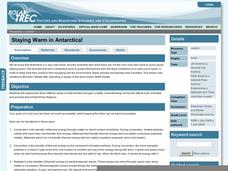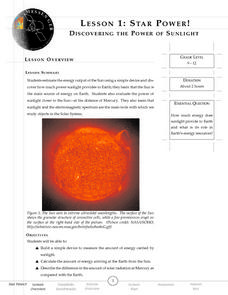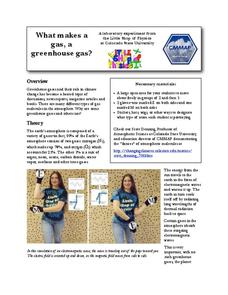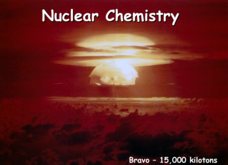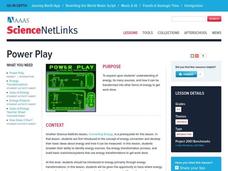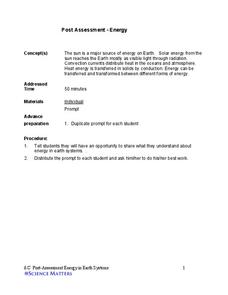K20 LEARN
This Is How the World Ends: Coronal Mass Ejections/Space Storms
Is this the end of the world as we know it? Pupils prepare for a coronal mass ejection during a lesson from the K20 Center. The activity combines video and Internet research in a collaborative assignment that focuses on public safety...
Purdue University
Can You Make an Ultra Violet (UV) Light Detector?
Light the way to a better understanding of UV radiation. After exploring how UV beads work, future engineers design investigations to answer questions about UV radiation. They then create and test prototypes of a device that detects UV...
American Museum of Natural History
Light Quest
Grab a partner and shed some light on light. A remote learning resource has scholars play a board game to answer trivia questions about light. They also read about how Einstein contributed to the understanding of light as both a wave and...
Curated OER
Chapter 7 Practice Problems
In this space science activity, students identify ultraviolet beams and what occurs when the frequency is doubled. They identify how long it would take to send a radio message from a space probe of Mars to earth. Students also determine...
Polar Trec
Staying Warm in Antarctica!
Has your class ever wondered how animals and scientists stay warm in the Polar Regions? Kids will investigate to understand the three types of heat transfer and how heat transfer affects those trying to stay toasty in sub-zero...
Curated OER
Luminous Efficacy (Efficiency)
Students examine the basics of luminous efficacy and why it is used. In this light source lesson students test energy efficiency and the luminous efficiency for babies.
Curated OER
Communication - Vibration, Electronic Signals, and Electromagnetic Radiation
Students investigate how we use technology to communicate.
Curated OER
Obtain a visible spectra of chlorophyll a
High schoolers become familiar with the concept of spectroscopy or the study of the interaction of matter with electromagnetic radiation. They prepare solutions and measure absorbance at different wavelengths. Pupils comprehend that...
Curated OER
Sand or Rock? Finding Out From 1,000 km
Students observe how measurements are made with different instruments. In this remote sensing lesson students investigate the physical state of surfaces including the surfaces of the solar system.
Curated OER
Discovering The Power Of Sunlight
Students participate in a lesson that looks at the potential for energy from sunlight. Students conduct research from a variety of resources and construct an object that is used to measure the energy of sunlight and calculate the amounts...
Curated OER
Can You See the Music?
Fourth graders examine the makeup of the electromagnetic spectrum and how the various forms of EMRs are similar and different from each other. They, in pairs, solve problems from worksheets imbedded in this lesson plan.
Colorado State University
What Makes a Gas, a Greenhouse Gas?—The Carbon Dioxide Dance
Investigate a heated topic in environmental science. Scholars team up to play the parts of gas molecules in the atmosphere. As the teacher moves about, acting as the electromagnetic wave, learners react as their molecules would to the...
Science Geek
Nuclear Chemistry
Which bichemicals wash up on shore? Nucleotides! Presentation covers alpha, beta, and gamma radiation. Includes a comparison of fission versus fusion. Presentation is the second in a five-part series.
Curated OER
Power Play
Once your physical science stars have a grasp of the different forms of energy, use this resource to get them putting the energy to work. Small groups choose from seven different project options and work together to build an energy...
Curated OER
What's That You're Saying Out There?
Students are able to demonstrate knowledge of natural and artifical satellites. They are able to demonstrate the differeence between "active" and "passive" communciation. Students are able to define radio waves, amplification reflection,...
Curated OER
Fluorescence
Here are some instructions for leading learners through a hands-on activity for investigating ultraviolet radiation. First, introduce them to light and refraction. Then introduce them to the electromagnetic spectrum. Finally, give...
NASA
Cosmic Microwave Background
Begin your next class with a BANG! Pupils discuss the formation of our universe and its expansion before proceeding with an activity designed to demonstrate what most likely occurred billions of years ago. They conclude with a discussion...
Curated OER
Radiation From Space
In this space worksheet, learners will review different aspects of light, sound, and radio waves in space and the use of different types of telescopes. This worksheet has 17 fill in the blank statements.
Curated OER
Energy: Nuclear Power
In this energy and nuclear power worksheet, learners, with a partner, discuss what thirteen energy terms mean and match those same terms to their definitions in the second activity.
Colorado State University
Why Does it Get Colder on a Clear Night than a Cloudy Night?
Clouds are nature's insulator! A lab investigation asks learners to use an infrared thermometer to measure differences in infrared temperatures. They find that pointing the thermometer at a cloud has a much different result than pointing...
Science Matters
Post-Assessment Energy
After nine lessons and activities about energy, here is the final assessment. The 20-questions include multiple choice, multiple choice with justification, short answer, answer analysis, and labeling diagrams to challenge learners.
University of Minnesota
Homeostasis of Thermoregulation
Whether you're battling the flu or trying to warm up on a chilly day, your body's ability to react to temperature change is fascinating! Anatomy scholars discover the fantastic feedback loops that control body temperature in a rigorous...
Curated OER
Albedo and Irradiation of Surfaces
Here is a physical science activity where pupils place thermometers inside of a white and a black paper pocket and place them under a lamp. They record and compare the temperature increase over a ten-minute period. Have your class...
Rice University
College Physics for AP® Courses
Take a look at an organized physics course. The 34-section electronic textbook covers material in AP® Physics 1 and 2. Teachers use the text to supplement lectures and have the class work through the labs. Each section contains...






